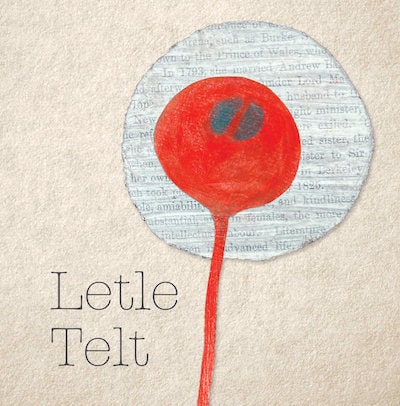Lainey Dempsey
Letle Telt
Self Released
2023

Beginning with the necessary biog: Lainey Dempsey is from Glasgow and has specialised in independent interactive arts and theatre for over 20 years. She is a singer and songwriter and frequently works collaboratively with musicians and artists as a vocalist and visual artist. But surprisingly, Letle Telt is Lainey’s first album release. It’s a direct product of her experience of the past three years of lockdown, the undoubted catalyst being her chance introduction, in late March 2020, to online singing sessions hosted by Dublin’s renowned An Góilín singing club. Logging on to those sessions turned out for Lainey (and others, including myself) the first step toward the discovery of a welcoming and inclusive community of singers, singing from their kitchens and couches, primarily throughout Ireland but also over in the UK and Europe and right across the globe. The transformative experience of sharing songs through this medium was to nurture Lainey’s eagerness to embrace more extensive listening to traditional singers and to undertake considerable, deeper research into traditional songs and stories. It seems entirely natural and fitting, then, that Lainey’s gift to us is an album performed in the medium that has long held a special interest for her, that of pure unadorned unaccompanied singing.
On everything she sings, Lainey displays an entirely natural commitment, a sense of absolute conviction, and possessing the true gift of an ability to communicate the messages and essence of her songs and stories. Her delivery is strongly accented and totally authentic, to the manner born and clearly deriving her inspiration from time-honoured role models, key storytellers-in-song such as Jean Redpath and Ray Fisher (to name but two).
Put simply, Lainey’s singing is irresistible, exhibiting a stylish confidence that’s most appealing and makes friends immediately—confident and natural, bright and chirpy with a gentle vibrato. Deftly tongued, Lainey makes light work of Dr David Rorie’s fun tale of The Lum Hat Wantin’ The Croon and dispatches the “swift little blast of joy and resistance” that is Brisk Young Lassie in a smidgen over a minute! On The Howff o’ Tibbie Pagan, Lainey pays tribute to the funny and formidable proprietor of a popular, albeit unofficial public house in New Cumnock in the mid-18th century. In contrast, the philosophical My Heart’s My Ain is done to a deceptively jaunty air. But best of all, Lainey delivers a showstopping account of the traditional ballad Broomfield Wager, which, though probably derived from Malinky’s version, has an individuality and a sense of purpose and a delectably controlled rhythmic bounce, a tripping momentum that’s pure Lainey. There’s a similarly infectious swinging, ringing gait to Lainey’s own composition Mary La Belle, which tells of Dublin suffragette Mary Maloney and her trip to Dundee in 1908 to “literally noise up Winston Churchill during his campaigning to become an MP”. Lainey clearly identifies strongly with such feisty women, and this comes through par excellence on the anthemic, defiant We Are Not Removing, a portrait of Mary Barbour (née Rough) and her part in the Glasgow Rent Strikes of 1915.
Where the material demands a more lyrical approach or more measured pacing, there’s no lack of gravitas in Lainey’s presentation. The seven-minute, inevitably unfolding story of Mary’s Dream (from Robert Chambers’ 1890 collection The Songs of Scotland Prior To Burns, is masterly in its understated depth of expression, a transfixing, mesmerising, nigh pin-drop performance which Lainey herself describes as “once I was in it, there’s no coming back till the end”. A comparable feel permeates Lady Grange’s Lament, Lainey’s retelling of the distressing story of Rachel Chiesley, whose fate was to be cruelly exiled by her womanising husband. An additional, eerily effective ambience is imparted on these two songs by a fluid Ebow drone courtesy of Lainey’s producer, Stevie Jones.
Auld Robin Gray, a popular song from 1771 that credits a woman (Lady Ann Lyndsey) with its authorship, sports a melody that’s uncannily reminiscent of I Am Stretched On Your Grave, while the heartfelt and moving Naebody Kens Ye turns out to be a rarely sung gem from the pen of Robert L. Malone in the mid-19th century (Lainey also provides some neat harmonies on this song’s refrain),
I’ve left mention of two favourite tracks until last. Selkie Bairn, Lainey tells us, is the second of her self-penned “Selkie songs”, in which she responds to the male selkie folktales by positing a more realistic picture of the outcome, whereas the album closer, Lang May Yer Lums Reek, written for New Year of 2022, is a thoroughly genuine expression of well-wishing that’s guaranteed to loosen up the listener’s vocal cords to enable hearty joining-in with the generous seasonal toast.
With this album, Lainey brings directly into our homes the close-knit experience of sharing songs – in this case, as it were, around a convivial campfire (much of the album was recorded on location in a glen in the Scottish Highlands). And amongst the songs and stories, Lainey takes a childlike delight in interspersing glimpses of a minimalist “old curiosity shop” of obscure found sounds (breadbin chime, brass box hinge, drawer knocker, etc.).
Yes, Letle Telt is magic! It is a humble and honest endeavour, shot through with truth and integrity, great singing and writing. The package is an intensely attractive proposition for the purchaser, adorned with characterful cover art (by Gail Power). There’s a copiously annotated, brilliantly researched lyrics booklet crammed with Lainey’s own insightful commentary and personal observations. The whole package has a delightfully homemade aspect, and a healthy variety of purchasing options can be browsed on Lainey’s website and Bandcamp page.
They Lyrics and Stories are beautifully presented here: https://www.laineyd.org/letle-telt
Bandcamp: https://laineydempsey.bandcamp.com/album/letle-telt
